Vitamin D deficiency has emerged as one of the most widespread nutritional challenges of our time, crossing geographical and demographic boundaries worldwide. Despite its critical importance for bone health, immune function, and overall wellness, an estimated 1 billion people globally have low vitamin D levels, with over 40% of Americans and Europeans failing to meet optimal status.[1,2]
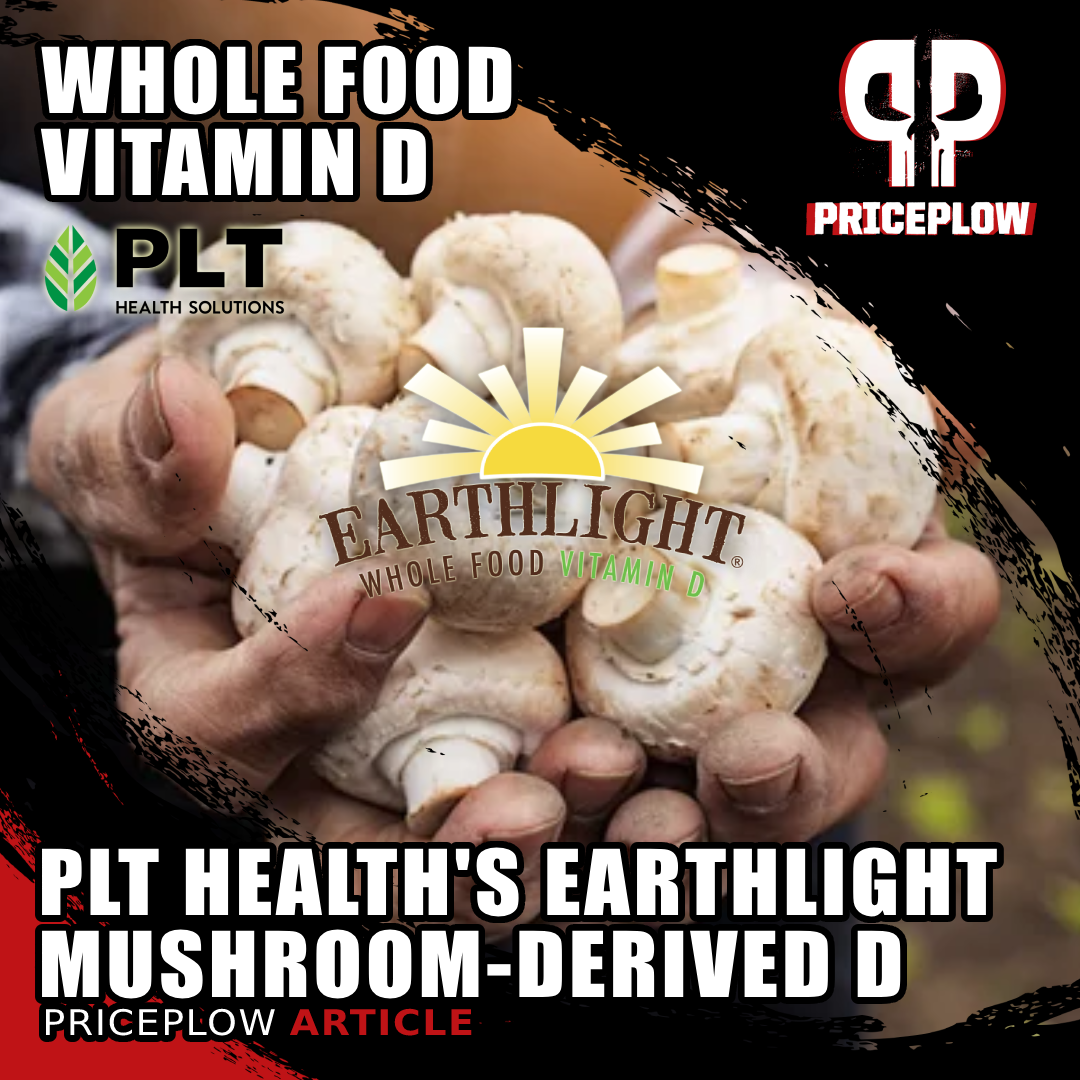
Discover Earthlight® Whole Food Vitamin D from PLT Health Solutions -- a revolutionary plant-based vitamin D source made from mushrooms grown in the USA! This clean-label, vegan-friendly ingredient tackles the global vitamin D deficiency crisis with nature's solution.
The Sunshine Crisis
The prevalence of vitamin D insufficiency continues to increase despite widespread awareness. As our lifestyles shift indoors and sun exposure decreases, modern humans face a significant challenge in maintaining adequate vitamin D levels, especially during winter months. This deficiency spans all demographics but more seriously affects people who spend most daylight hours indoors, those with darker skin, the elderly, and anyone living in northern latitudes.
With food sources of vitamin D being limited and many people fearing direct sunlight, supplementation has become the next line of defense. However, most vitamin D supplements come with a significant drawback - they're not plant-based.
The Traditional Vitamin D Dilemma
For years, we've faced a dichotomy in the vitamin D world:
- Vitamin D3 (cholecalciferol) - The form naturally produced in human skin and found in animal-sourced foods. Most D3 supplements are derived from lanolin (a product of sheep's wool), making them unsuitable for vegans.
- Vitamin D2 (ergocalciferol) - Historically available as a pharmaceutical and supplement, often produced through solvent extraction from UV-irradiated yeast. While plant-derived, conventional D2 isn't truly a whole food, and may contain residual byproducts.
This has left vegans, vegetarians, and whole-food enthusiasts with limited options for maintaining optimal vitamin D status - until now.
Earthlight: Vitamin D Revolution from Mushrooms Made in the USA
Earthlight® Whole Food Vitamin D is a groundbreaking solution from PLT Health Solutions that provides a clean-label, vegan source of vitamin D2 derived from white button and portobello mushrooms. Unlike other vitamin D sources that rely on chemical processing or animal products, Earthlight harnesses the natural power of mushrooms exposed to light, mimicking a process that's been occurring in nature for over 500 million years.[3]
What makes Earthlight revolutionary is its American-based production method: whole mushrooms are exposed to UV light, naturally converting their abundant ergosterol content into vitamin D2! The result is a truly natural, minimally processed whole food ingredient that delivers concentrated vitamin D2 without artificial additives, chemical solvents, or binders.
Earthlight represents a significant advancement for:
- Vegans and vegetarians seeking plant-based vitamin D
- Health-conscious consumers preferring whole food nutrients
- Manufacturers creating clean-label products
- Anyone looking for a sustainable, USA-made vitamin D source
This article dives into Earthlight and the science on vitamin D2 compared to vitamin D3 -- what you've been told about the differences may not have been the exact truth! Before getting into the details, subscribe to PricePlow's newsletter for cutting-edge nutrition science and PLT Health Solutions news alerts:
Subscribe to PricePlow's Newsletter and Alerts on These Topics
Understanding Vitamin D
Vitamin D is much more than just another vitamin -- it's a pro-hormone that plays a crucial role in countless bodily functions. Despite its importance, vitamin D deficiency is an epidemic affecting people worldwide.[4]
Basic Vitamin D Science and Metabolism
The story of vitamin D begins with exposure to sunlight. When our skin is exposed to ultraviolet B (UVB) radiation, a photochemical reaction converts 7-dehydrocholesterol in our skin to previtamin D3, which then naturally transforms into vitamin D3 (cholecalciferol) through a heat-driven molecular change.[5] This vitamin D3 enters the bloodstream and is processed by the liver into 25-hydroxyvitamin D [25(OH)D], the main form found in the blood and used to measure vitamin D levels. It's then further converted in the kidneys into the active form, 1,25-dihydroxyvitamin D.
While the sun is our primary natural source of this nutrient, dietary sources are crucial when sun exposure is limited. There are two main dietary forms of vitamin D:
- Vitamin D2 (ergocalciferol) - Found in UV-exposed mushrooms and yeast
- Vitamin D3 (cholecalciferol) - Found in animal sources like fatty fish and egg yolks
Both forms undergo the same metabolic transformations in the body, being converted to their respective 25-hydroxy and 1,25-dihydroxy forms.
Vitamin D2 vs. D3: Debunking Misconceptions
For decades, a debate has persisted about whether vitamin D2 and vitamin D3 are equally effective in raising and maintaining blood levels of 25(OH)D. Some reports have suggested that vitamin D2 is less effective, leading to confusion among healthcare professionals and consumers. However, recent research has thoroughly challenged these misconceptions.
The primary difference between these two forms is their side chain structure: Vitamin D2 has a double bond between carbons 22 and 23 and a methyl group on carbon 24,[6] which are features that are absent in vitamin D3. This structural difference has led to questions about potential differences in biological activity, but current evidence shows that these structural variations have minimal impact when the vitamins are consumed regularly.

Beyond being vegan and non-GMO, Earthlight offers a comprehensive clean profile free from gluten, artificial additives, chemical preservatives, and carriers while maintaining its whole food integrity.
Scientific Evidence for Bioequivalence of Daily D2 and D3
Several well-designed clinical studies have demonstrated that vitamin D2 is equally effective as vitamin D3 when taken regularly in physiological doses. Here's what the science tells us:
- In 2008, Holick and colleagues conducted a landmark 11-week study comparing 1000 IU daily of vitamin D2, vitamin D3, or a combination of 500 IU of each. Their results showed conclusively that vitamin D2 was equally effective as vitamin D3 in raising and maintaining total serum 25(OH)D levels. This study directly challenged previous conclusions that had suggested vitamin D2 was less effective.[7]
- In another important study published in 2010, Biancuzzo and colleagues found no difference in total 25(OH)D levels in healthy adults who consumed orange juice fortified with 1000 IU of vitamin D2 versus vitamin D3. This research confirmed that vitamin D2 fortification in foods is as effective as vitamin D3 for maintaining vitamin D status.[8]
- Following up in 2012, Fisk, et al. examined low-dose (5 μg or 10 μg daily) vitamin D2 and D3 in fortified malted milk drinks over 4 weeks. Their conclusion? "D2 and D3 are equipotent in increasing 25-OH-D in healthy men and women with negligible UV-B exposure." This study is especially relevant because it used doses similar to those found in fortified foods.[9]
- Perhaps most relevant to our discussion of Earthlight, Urbain and colleagues conducted a controlled trial specifically examining the bioavailability of vitamin D2 from UV-B-irradiated button mushrooms.
In their 5-week study published in 2011, participants received either 28,000 IU of vitamin D2 from UV-irradiated mushrooms, the same dose as a supplement, or a placebo weekly. The results were clear:
"We are the first to demonstrate in humans that the bioavailability of vitamin D2 from vitamin D2-enhanced button mushrooms via UV-B irradiation was effective in improving vitamin D status and not different to a vitamin D2 supplement."[10]
- In 2013, Keegan's research on mushrooms exposed to UVB radiation revealed that they not only produce vitamin D2 but also, in some cases, vitamin D3 and vitamin D4. Their clinical trial showed that "ingestion of 2000 IUs of vitamin D2 in mushrooms was as effective as ingesting 2000 IUs of vitamin D2 or vitamin D3 in a supplement in raising and maintaining blood levels of 25-hydroxyvitamin D."[6]
- Also published in 2013, Gallo and team investigated vitamin D supplementation specifically in infants. They provided infants with 400 IU of either D2 or D3 daily for 3 months and found "the increase in the 25(OH)D concentration among the D2 and D3-supplemented infants did not differ, suggesting daily intake of either isoform is acceptable for infants." This evidence extends the bioequivalence case to the youngest and most vulnerable population.[11]
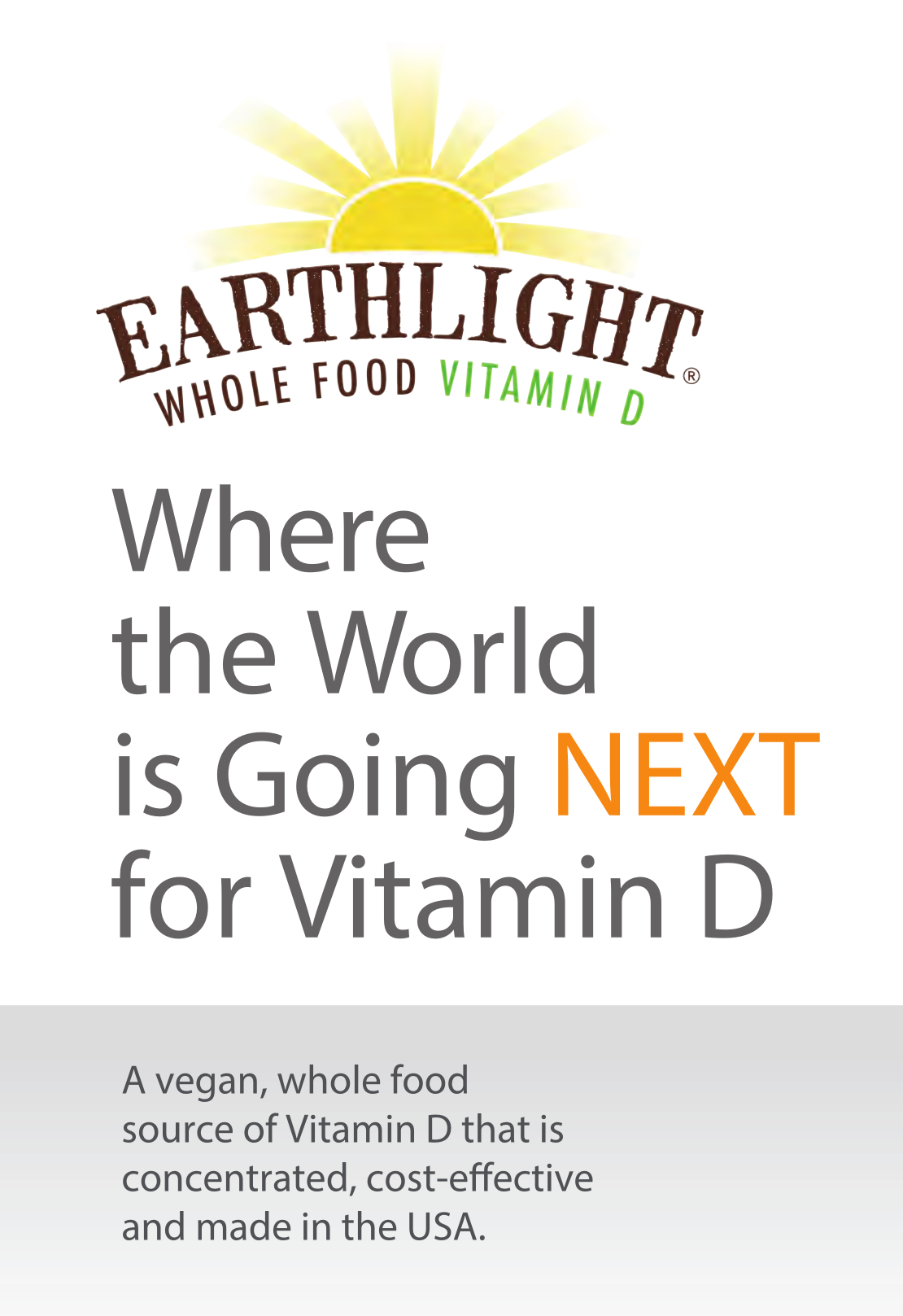
The evolution of vitamin D supplementation is trending toward whole food, plant-based sources that offer the concentrated potency of Earthlight without compromising ethical or clean label standards.
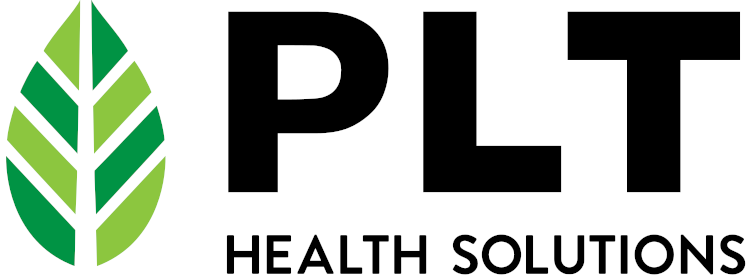
PLT Health Solutions: Growth Through Innovation
These studies collectively demonstrate that when taken daily or weekly at nutritionally relevant doses, vitamin D2 and vitamin D3 are bioequivalent in their ability to raise and maintain serum 25(OH)D levels. This equivalence extends across various age groups, from infants to adults, and is maintained whether the vitamin D is consumed in supplement form or from natural food sources like UV-exposed mushrooms.
The Institute of Medicine supports this conclusion, stating in their Dietary Reference Intakes that "the two forms [of vitamin D] appear to be equivalent and adequate for almost all infants."[11]
Given the scientific evidence, it's clear that vitamin D2 from sources like Earthlight provides an effective means of maintaining vitamin D status, offering a plant-based alternative that is especially valuable for vegetarians and vegans who may struggle to obtain adequate vitamin D from traditional food sources.
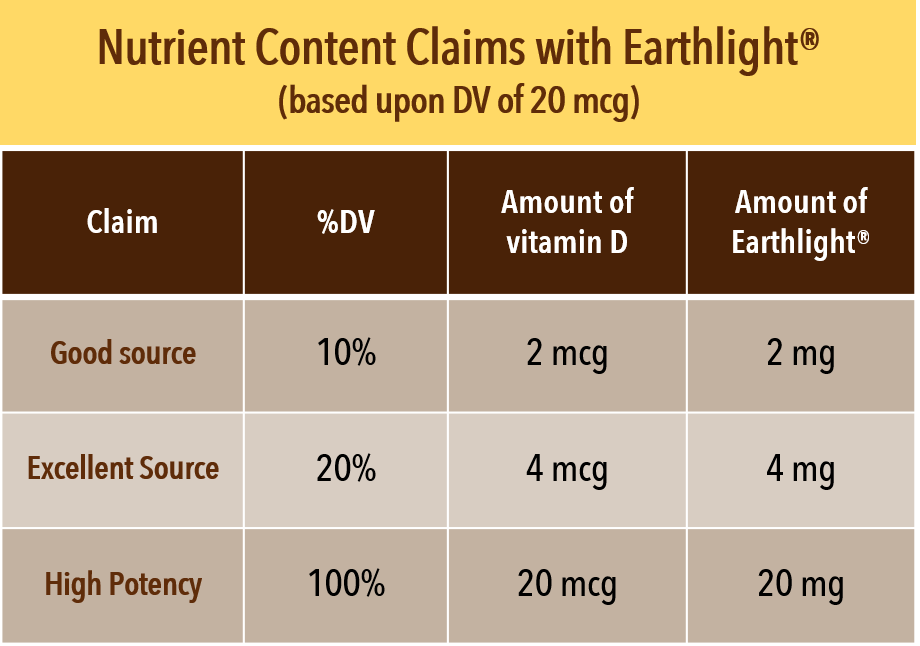
Earthlight's concentrated formula allows brands to make various nutrient content claims with minimal ingredient amounts - just 2mg qualifies as a "good source" while 20mg delivers 100% of the daily value for vitamin D.
This brings us to Earthlight specifically:
Earthlight: Nature’s Vitamin D Solution from PLT Health Solutions
Earthlight® Whole Food Vitamin D represents a breakthrough in natural vitamin fortification. Developed by PLT Health Solutions, Earthlight is a clean label, plant-based vitamin D ingredient that delivers concentrated nutrition without affecting taste or texture in formulations.
Earthlight offers formulators an opportunity to create cutting-edge supplements and fortified foods that align with today's consumer preferences for whole food nutrition, and give them the ability to reach the vegan market without compromising on quality.
What is Earthlight?
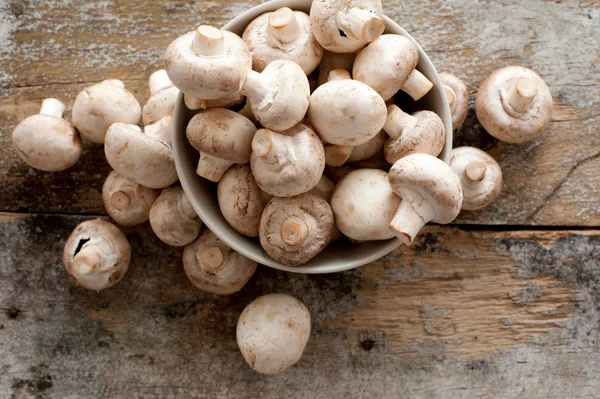
White button mushrooms serve as the primary source material for Earthlight, providing an abundant supply of ergosterol that converts to vitamin D2 when exposed to UV light, creating a clean, plant-based nutrient solution.
Earthlight is a 100% natural, minimally-processed whole food ingredient derived from white button and portobello mushrooms. These wholesome mushrooms are carefully milled into a powder and exposed to light using a proprietary process that enhances their vitamin D2 content.
The science behind Earthlight mirrors what happens in nature. Just as human skin produces vitamin D3 when exposed to sunlight, mushrooms naturally convert their abundant ergosterol content to vitamin D2 when exposed to UV light![6] This process allows Earthlight to deliver a potent 1000 μg (40,000 IU) of vitamin D per gram of material, making it one of the most concentrated natural plant-based vitamin D sources available today.
Key Features and Benefits
Earthlight stands apart from other vitamin D sources with its impressive range of benefits:
-
Clean Label Excellence
- 100% Whole Food - Unlike extracted or synthetic alternatives
- Non-GMO - Free from genetic modification or genetically-modified mushrooms
- Vegan-Friendly - Plant-based source ideal for all dietary preferences
- Free from Carriers and Binders - No additives or fillers required
- Solvent-Free Processing - No chemical extraction methods used
-
Formulation Advantages
- Highly Concentrated - Requires very dosage levels (typically 15-20 mg/day), easily fitting into a capsule with room to spare
- Neutral Organoleptic Profile - Minimal impact on taste or texture
- Excellent Economics - Cost-effective even at nutritionally significant levels
- Versatile Application - Works in dietary supplements, foods, and beverages
-
Consumer-Friendly Labeling Options
- Can be labeled simply as "vitamin D from mushroom powder" or "mushroom powder"
- Supports claims like "Natural" and "Non-GMO"
- Compatible with organic certification (organic grades available)
-
Sustainability Advantages
- Locally Sourced - Mushrooms grown and processed in Pennsylvania, reducing transportation carbon footprint (PLT Health Solutions is located in New Jersey).
- Resource-Efficient Production - Mushroom cultivation requires significantly less water, land, and energy compared to animal-derived vitamin D sources
- Circular Economy - Utilizes the natural photobiology of mushrooms without requiring chemical synthesis or extraction processes
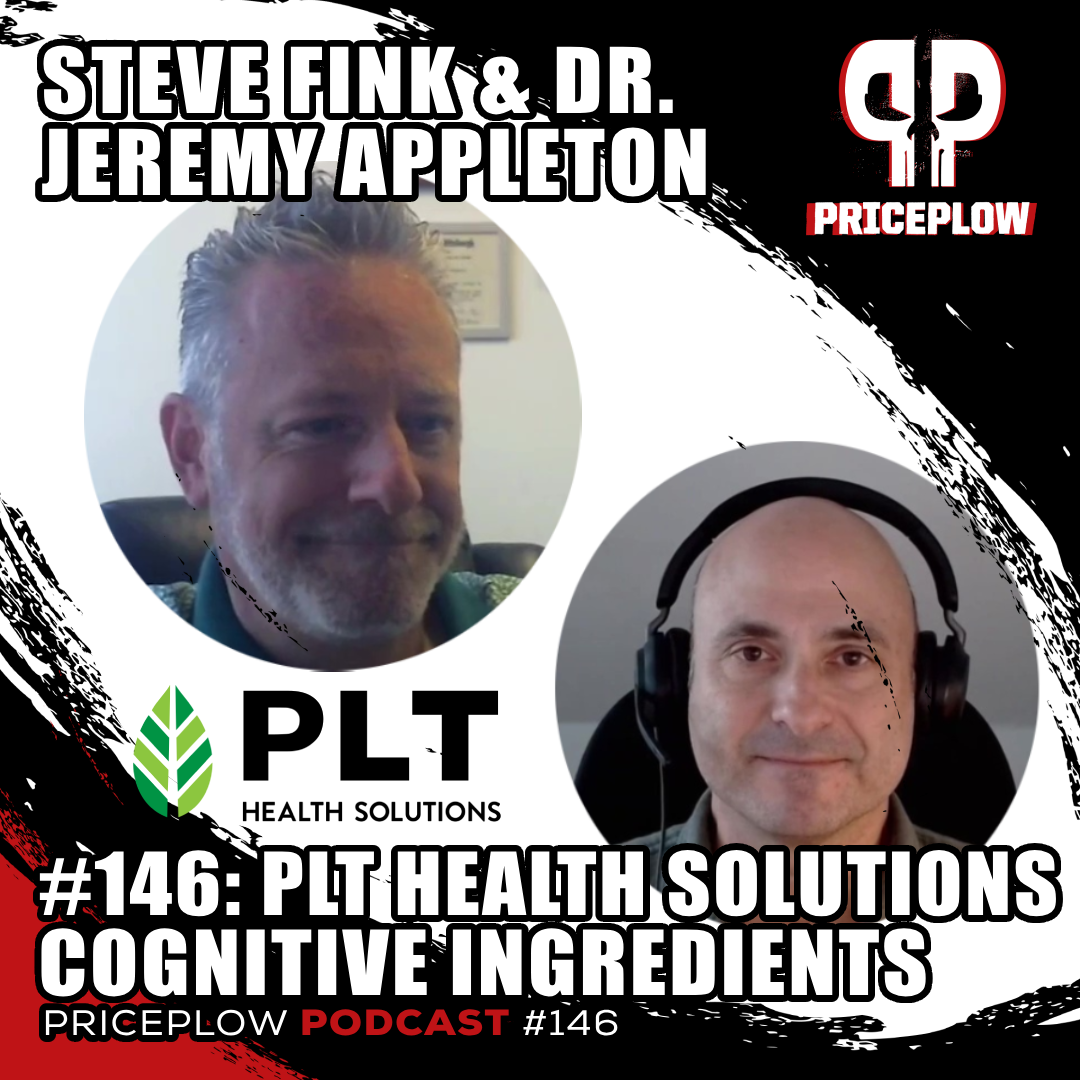
Dive into PLT Health's cognitive platform with Steve Fink and Dr. Jeremy Appleton, exploring Zynamite, Zembrin, and Vanizem's impact on brain health in Episode #146 of the PricePlow Podcast
Production and Quality Standards
As discussed in our podcast with Dr. Jeremy Appleton and Steve Fink discussing the PLT Health cognitive platform, PLT Health Solutions maintains stringent quality control throughout their vetting processes, and that includes the Earthlight production process:
- USA-Grown Source Material - Mushrooms sourced from American farms in Pennsylvania
- Patented Technology - Protected by US Patent #8,545,915[12] and EU Patent EP2900089B1[13]
- Consistent Potency - Reproducible nutrient composition with two-year shelf-life stability
- Regulatory Compliance - US FDA FAP approval (21 CFR 172.382) and EFSA Novel Food status
- Certifications - USDA GAP and GMP certified, with Kosher and Halal options available
The quality and efficacy of Earthlight have been verified through rigorous clinical testing. As discussed above, a randomized controlled trial comparing UV-B-irradiated button mushrooms to traditional vitamin D supplements found that vitamin D2 from mushrooms was equally effective at raising and maintaining healthy blood levels of 25-hydroxyvitamin D compared to supplemental vitamin D3.[10]
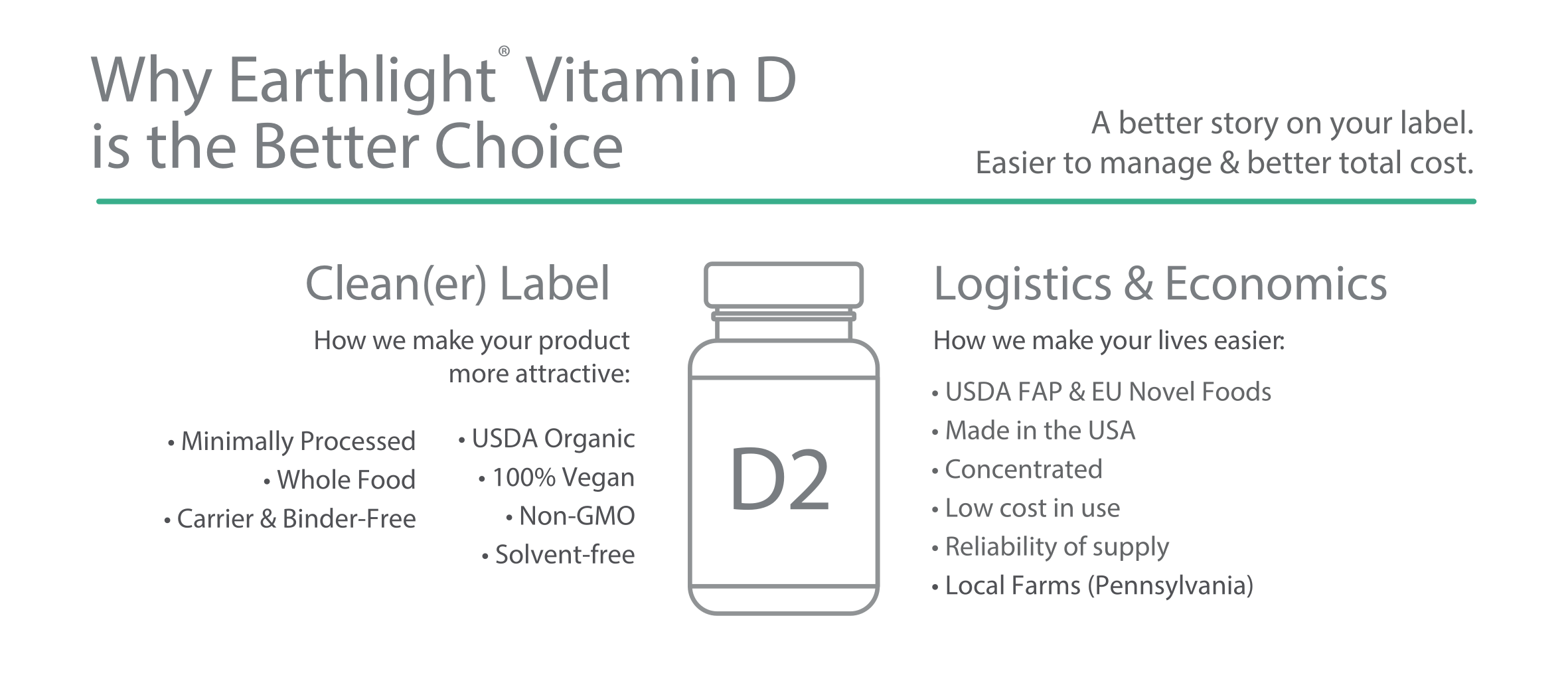
Earthlight offers a cleaner label alternative to traditional vitamin D sources with carrier-free formulation, while maintaining cost-effectiveness through USA-based production and minimal processing.
For brands looking to create next-generation fortified products and supplements, Earthlight delivers the rare combination of clean label appeal, formulation versatility, and clinically validated effectiveness. It's truly a natural solution for vitamin D fortification in today's market.
The Science Behind Earthlight
Photobiology of Vitamin D in Mushrooms
Mushrooms represent a fascinating and unique source of vitamin D. While they contain very little vitamin D2 when grown in standard commercial conditions (typically less than 0.1 μg/100g fresh weight), they are exceptionally rich in ergosterol, the precursor to vitamin D2.[14]
The photobiology of vitamin D2 in mushrooms closely resembles the cutaneous synthesis of vitamin D3 in human skin. When mushrooms are exposed to ultraviolet B (UVB) radiation, their ergosterol is converted to previtamin D2, which then thermally isomerizes to vitamin D2.[6]
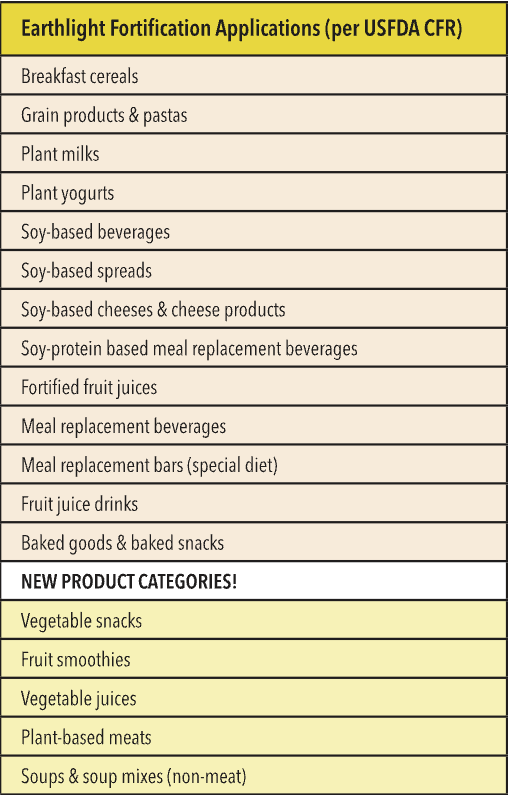
Earthlight has secured FDA approval for 18 food categories, including five previously unavailable for vitamin D fortification, expanding opportunities for manufacturers to create vitamin D-enriched plant-based products.
The process occurs as follows:
- UV radiation transforms ergosterol (provitamin D2) to previtamin D2
- Previtamin D2 undergoes thermal isomerization to form vitamin D2
- With continued UV exposure, photobyproducts such as lumisterol2 and tachysterol2 are formed
Research has shown that the conversion rate of ergosterol to vitamin D2 under UV irradiation depends on several factors:[15]
- The UV spectrum used (UV-B or UV-C)
- Irradiation dose and duration
- Moisture content of the mushrooms
- Orientation of the mushrooms toward the UV source
Scientists have discovered that when mushrooms are exposed to UVB radiation, previtamin D2 is rapidly converted to vitamin D2 through a non-enzymatic membrane-enhanced catalytic mechanism. This process is similar to what has been observed in lizard and human skin.[6]
Interestingly, the thermal isomerization of previtamin D2 to vitamin D2 occurs more rapidly in mushrooms than in organic solvents. This suggests that mushrooms employ a membrane-enhanced conversion process that has likely existed for hundreds of millions of years.[6]
The Earthlight manufacturing process harnesses this natural photobiology by exposing white button and portobello mushrooms to precisely controlled UV light.[12,13] This process produces a concentrated, stable source of vitamin D2 with consistent potency that can be used in a wide variety of applications.
Bioavailability of Mushroom-Derived Vitamin D2
A critical question for any nutritional ingredient is its bioavailability — how effectively it's absorbed and utilized by the body. Multiple human clinical studies have demonstrated that vitamin D2 from UV-irradiated mushrooms shows excellent bioavailability, comparable to supplemental vitamin D2 and D3.
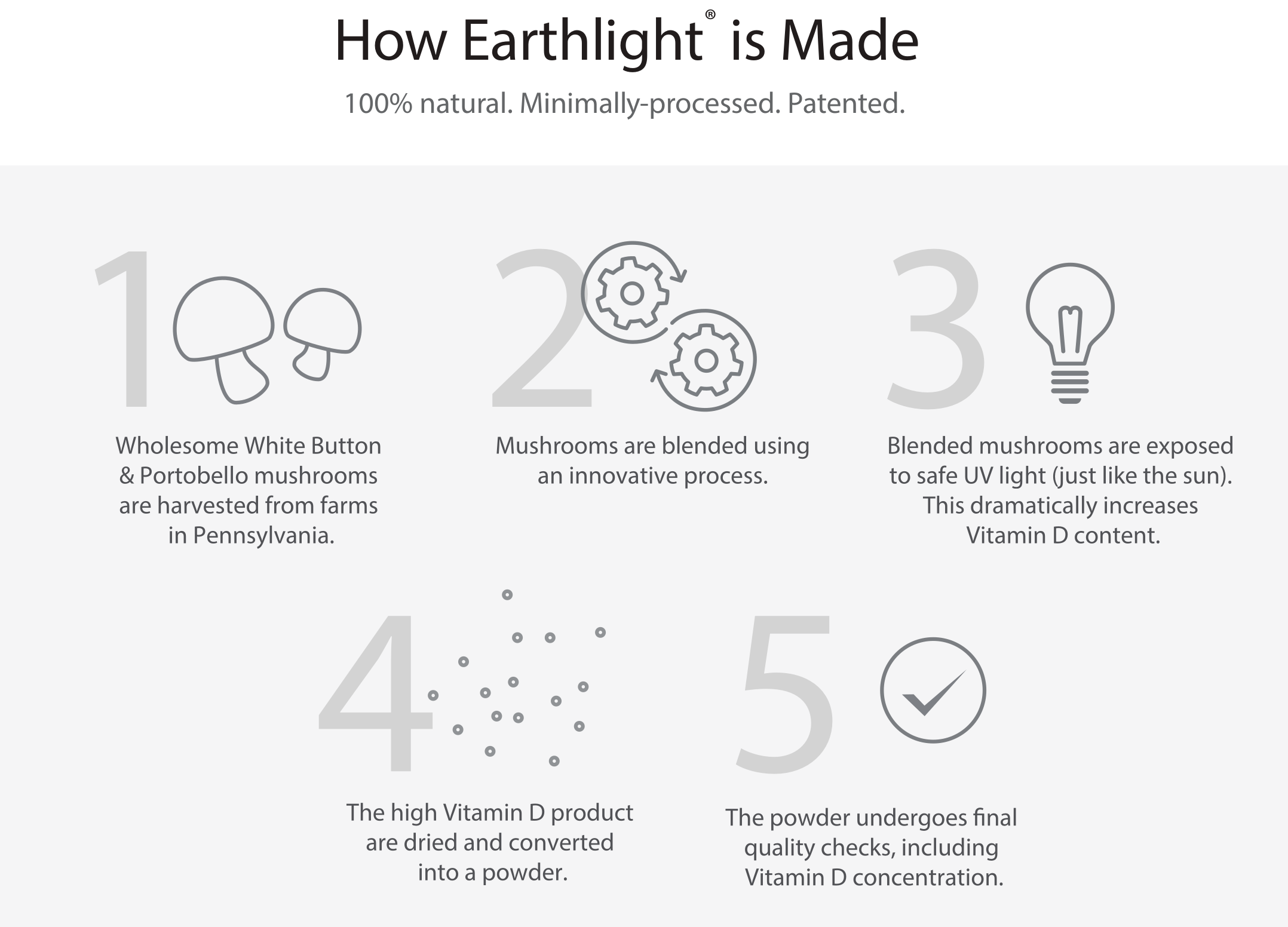
Pennsylvania-grown white button and portobello mushrooms undergo a proprietary UV light treatment that mimics natural sunlight exposure, converting ergosterol to vitamin D2 without solvents or chemical processing.
In a randomized controlled trial conducted by Urbain et al., researchers investigated the bioavailability of vitamin D2 from UV-B-irradiated button mushrooms in humans with vitamin D deficiency. Twenty-six healthy Caucasian adults with serum 25-hydroxyvitamin D [25(OH)D] levels below 20 ng/mL were randomly assigned to receive either:[10]
- 28,000 IU vitamin D2 from UV-irradiated mushrooms in soup
- 28,000 IU vitamin D2 as a supplement plus non-irradiated mushroom soup
- Non-irradiated mushroom soup with placebo (control)
The treatments were administered four times over a four-week period. Results showed that:[10]
- Serum 25(OH)D levels significantly increased in both treatment groups compared to placebo
- The increase in serum 25(OH)D was not significantly different between the mushroom and supplement groups
These findings demonstrated that vitamin D2 from UV-B-irradiated mushrooms is well absorbed and metabolized in humans, with bioavailability equivalent to a vitamin D2 supplement.
Keegan et al. conducted another clinical study to determine if ingestion of vitamin D2 in a dried white button mushroom extract was as effective at increasing and maintaining vitamin D status as supplemental vitamin D2 and vitamin D3. Thirty healthy adults were randomized to consume capsules containing:
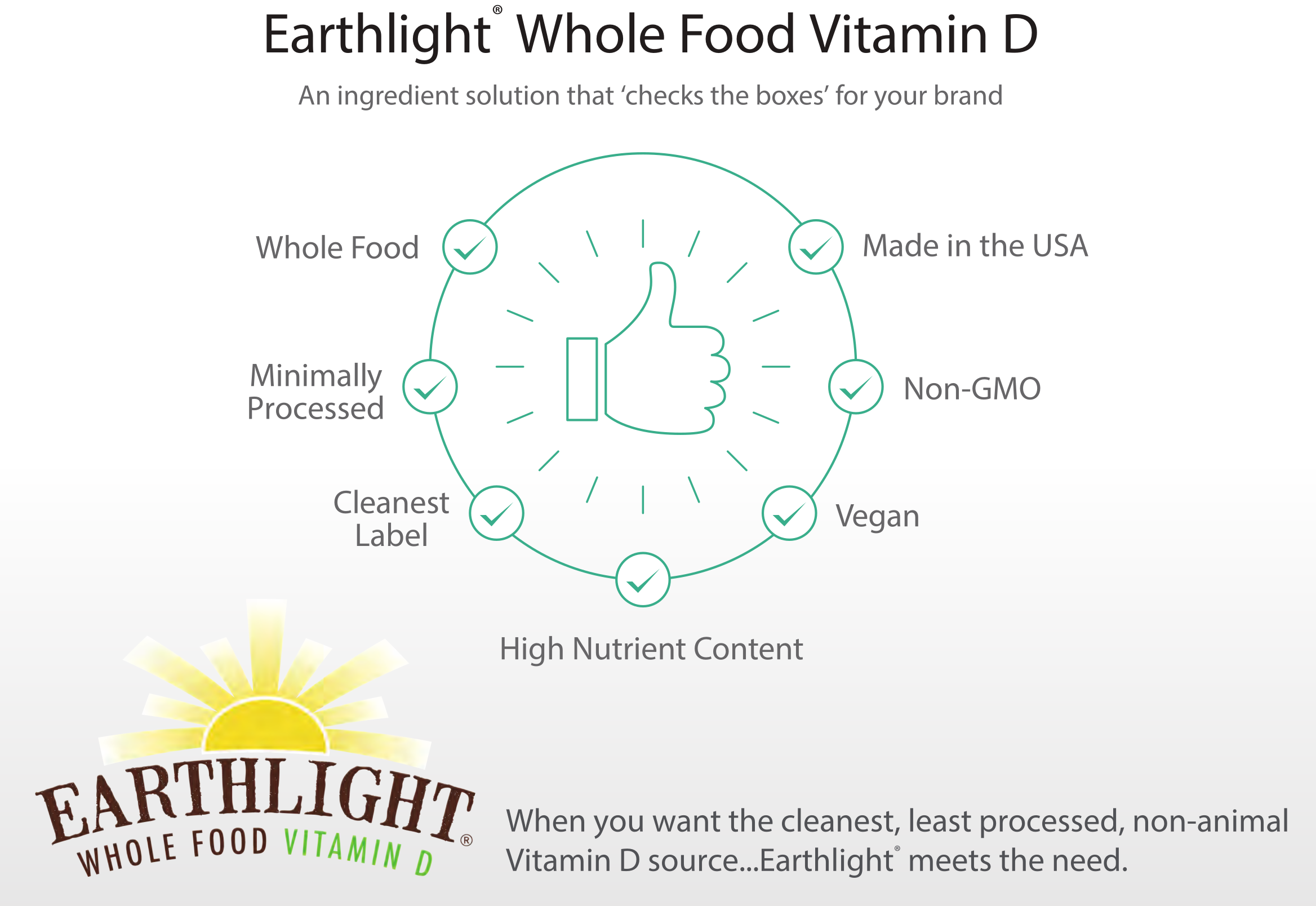
Earthlight delivers on seven key consumer demands: whole food sourcing, minimal processing, clean labeling, high nutrient content, vegan formulation, non-GMO ingredients, and American manufacturing.
- 2,000 IU mushroom vitamin D2
- 2,000 IU supplemental vitamin D2
- 2,000 IU supplemental vitamin D3
The subjects took these supplements daily for three months during winter. The results showed that:[6]
- Total serum 25(OH)D levels significantly increased in all treatment groups
- There were no significant differences in the final serum 25(OH)D concentrations between groups
- Ingesting 2,000 IU of vitamin D2 from mushrooms was as effective as ingesting the same amount from supplements
Clinical Evidence for Efficacy
The efficacy of vitamin D2 from mushrooms has been further validated in clinical research focusing on its ability to maintain healthy vitamin D status.
Holick et al. examined the effectiveness of vitamin D2 versus vitamin D3 in maintaining circulating concentrations of 25-hydroxyvitamin D. Their randomized, placebo-controlled, double-blinded study on healthy adults found that 1,000 IU daily of vitamin D2 was as effective as 1,000 IU of vitamin D3 in raising and maintaining total serum 25(OH)D levels over an 11-week period.[7]
This finding is significant for mushroom-derived vitamin D2, as it contradicts earlier claims that vitamin D2 might be less effective than vitamin D3 in maintaining vitamin D status.
Another study by Biancuzzo et al. found that consuming orange juice fortified with 1,000 IU of vitamin D2 was as effective as taking a 1,000 IU vitamin D2 or D3 supplement in maintaining vitamin D status in adults. The study observed no difference in the increase of 25(OH)D levels between the groups, supporting the concept that vitamin D2 from food sources is effectively absorbed and utilized.[8]
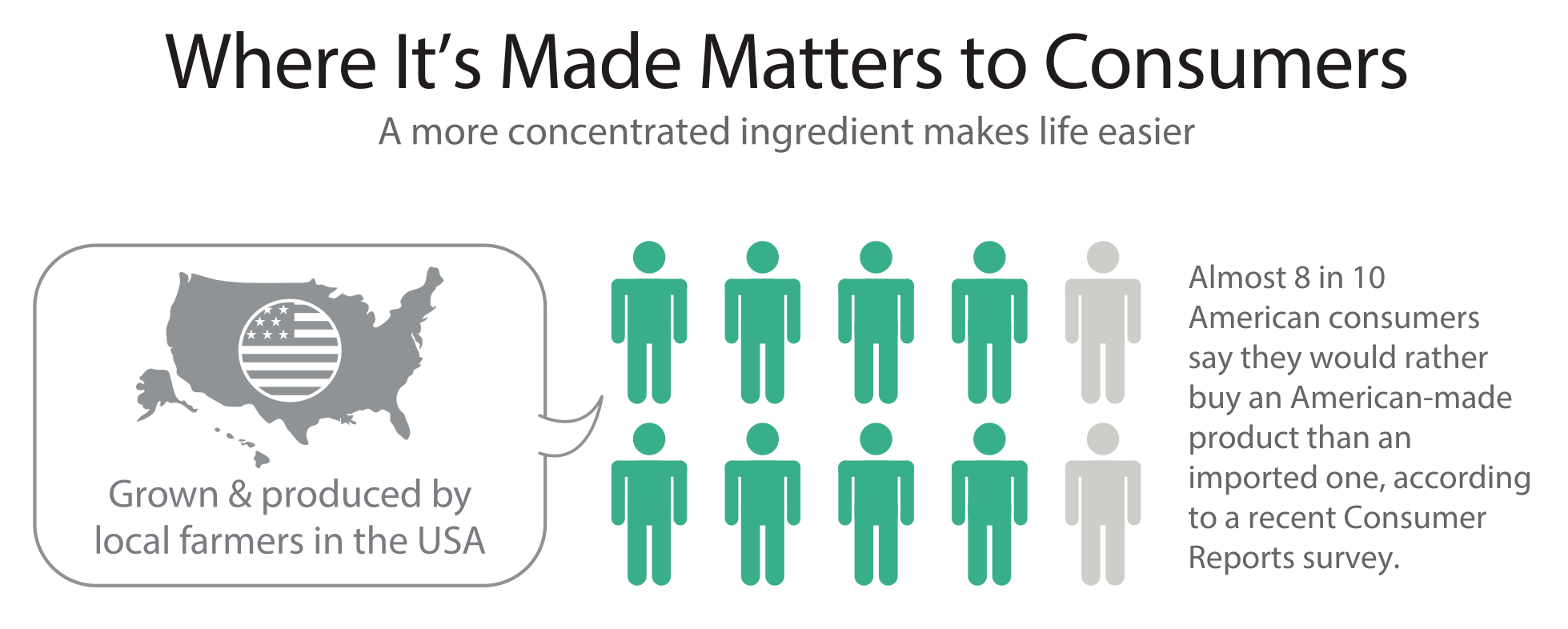
Nearly 80% of American consumers prefer domestically produced products, giving Earthlight's Pennsylvania-grown mushroom source a significant market advantage over imported alternatives.
A 2012 study by Stephenson et al. compared the effects of consuming UV-irradiated mushrooms containing vitamin D2 versus taking a vitamin D2 supplement. While they observed a significant increase in serum 25(OH)D2 levels in groups receiving the vitamin D2 (either from mushrooms or supplement), they also noted a small decrease in 25-hydroxycholecalciferol levels. However, the overall effect on total vitamin D status remained positive.[16]
Clinical research has also demonstrated that vitamin D2 from mushrooms is effective for long-term vitamin D maintenance. Pietras et al. showed that taking 50,000 IU of vitamin D2 once a week for eight weeks and every other week thereafter for up to six years successfully increased and maintained healthy serum 25(OH)D levels.[17]
Collectively, these studies provide robust evidence that vitamin D2 from mushrooms is not only bioavailable but also effective at improving and maintaining vitamin D status in humans. This scientific validation supports Earthlight as a reliable, natural source of vitamin D2 that can help address widespread vitamin D insufficiency through food fortification and supplementation.

Each gram of Earthlight delivers 1000mcg of vitamin D with verified potency, two-year shelf stability, and multiple certifications including USDA GAP, Kosher, and Halal approval.
Applications and Uses
Earthlight® Whole Food Vitamin D offers versatile applications across multiple food and supplement categories, providing manufacturers with a clean-label, vegan solution for vitamin D fortification. Unlike synthetic vitamin D sources, Earthlight delivers vitamin D2 from a whole food matrix, allowing brands to address growing consumer demand for natural, recognizable ingredients.
Food Fortification Opportunities
The FDA has approved Earthlight's use in a wide range of food products, creating significant opportunities for manufacturers seeking to enhance nutritional profiles with whole food vitamin D. This approval came through a successful Food Additive Petition, making Earthlight the first FDA-approved mushroom-derived vitamin D2 ingredient for food fortification.[18]
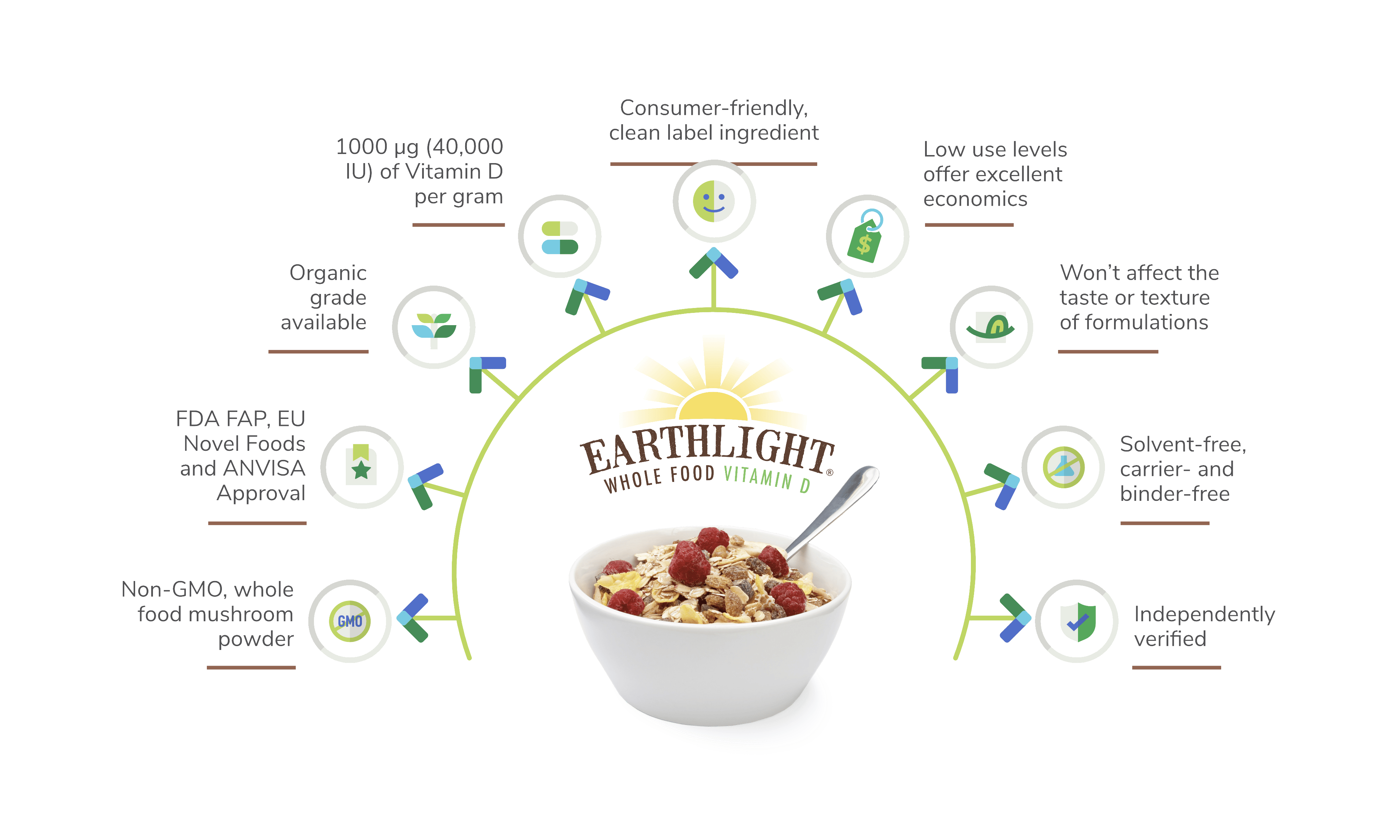
Earthlight's versatility extends to multiple food applications, offering excellent economics with low usage rates while maintaining neutral taste profiles in fortified products like cereals and other foods.
Key food applications include:
- Cereals and grain products: Breakfast cereals, bread, and pasta products can be fortified with Earthlight to improve their nutritional profile while maintaining a clean label.
- Dairy alternatives: Plant-based milk, yogurt, and cheese products benefit from Earthlight fortification, as these products typically lack the vitamin D content of their dairy counterparts.
- Fruit and vegetable products: Fruit juice, vegetable juice, and smoothies offer excellent delivery systems for Earthlight.
- Plant-based meats: As consumers shift toward plant-based proteins, Earthlight provides an important nutrient typically missing from meat alternatives.
- Soups and soup mixes: Earthlight's minimal impact on taste makes it ideal for savory applications.
Earthlight's low required dosage means it has negligible impact on the organoleptic properties of food products. The vitamin D content remains stable during cooking, freezing, defrosting, and reboiling, making it suitable for a wide range of food processing applications.
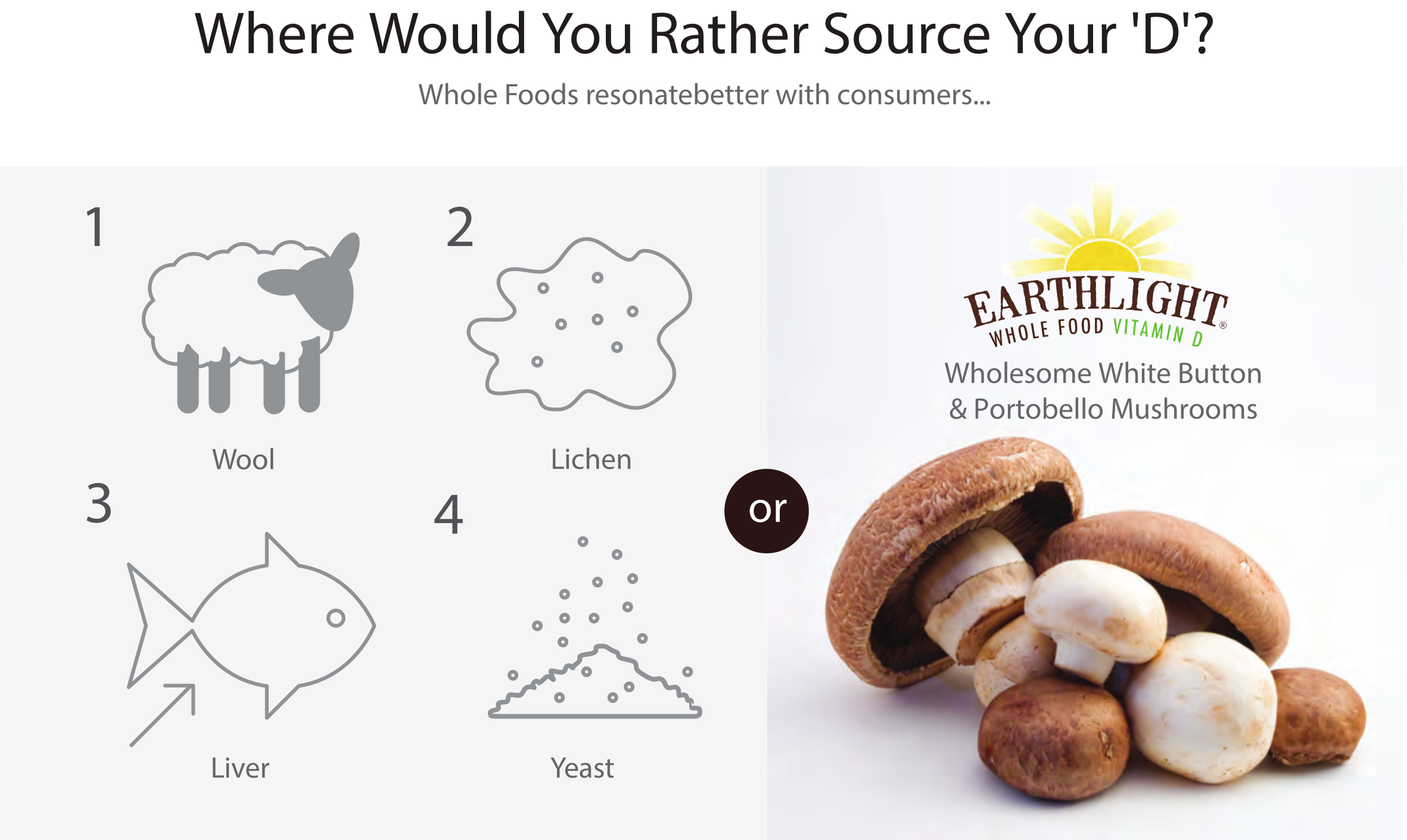
While traditional vitamin D3 comes from sheep's wool or fish liver, Earthlight provides a whole-food mushroom alternative that resonates with today's health-conscious consumers seeking plant-based nutrition.
Supplement Applications
Earthlight has been successfully incorporated into numerous supplement formats:
- Multivitamins: Brands like Garden of Life's mykind Organics line have incorporated Earthlight into their multivitamin formulations for men, women, prenatal, and seniors, highlighting its whole food origins on product packaging.
- Standalone vitamin D supplements: Companies like Avani Health and Nutrilite offer vitamin D products featuring Earthlight as a plant-based alternative to animal-derived vitamin D3.
- Specialty supplements: Earthlight has been incorporated into bone health formulas, immune support blends, and nutritional powders.
- Protein and meal replacements: Products like Juice Plus+ Complete shakes and Uplift's Daily Uplifter fiber powder incorporate Earthlight as part of their nutritional profile.
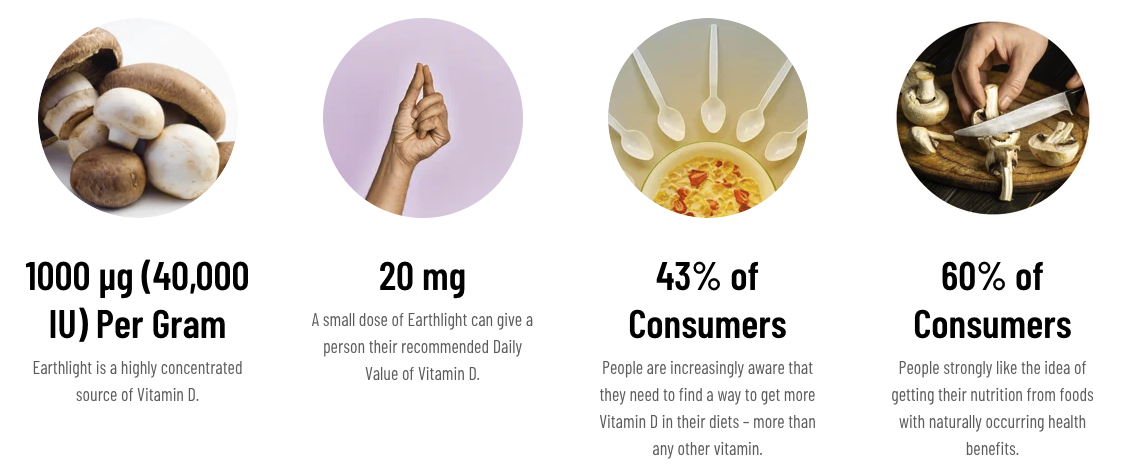
With 1000μg of vitamin D per gram, Earthlight delivers potent nutrition in small doses, addressing the needs of the 43% of consumers actively seeking vitamin D supplementation through natural food sources.
FDA Approved Food Categories
Through its Food Additive Petition approval, Earthlight is authorized for use in 18 food categories, including five that previously had no approved vitamin D fortification options:[18]
Traditional fortification categories:
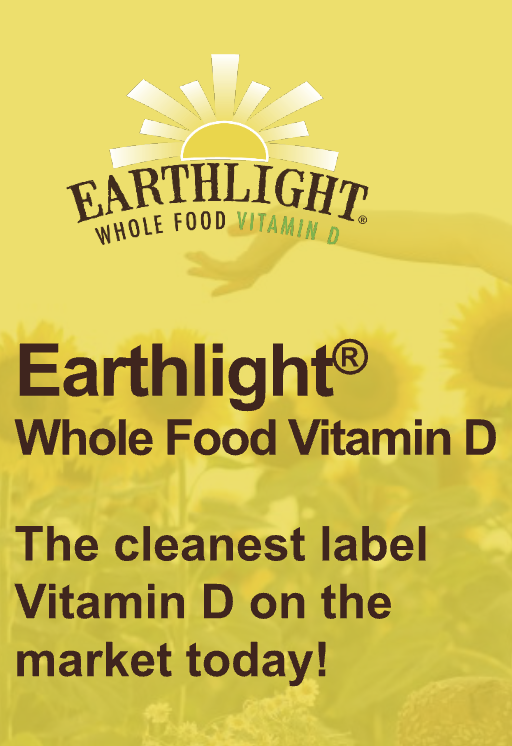
With no carriers, binders, or solvents, Earthlight offers formulators the cleanest vitamin D option available today, allowing brands to meet growing consumer demand for transparent, minimally processed ingredients.
- Breakfast cereals
- Grain products and pastas
- Plant milks
- Plant yogurts
- Soy-based beverages
- Soy-based spreads
- Soy-based cheeses and cheese products
- Soy-protein based meal replacement beverages
- Fortified fruit juices
- Meal replacement beverages
- Meal replacement bars
- Fruit juice drinks
- Baked goods and baked snacks
New product categories (previously not allowed in the US):
- Vegetable snacks
- Fruit smoothies
- Vegetable juices
- Plant-based meats
- Soups and soup mixes (non-meat)
The European Food Safety Authority (EFSA) has also granted Novel Food approval for Earthlight, allowing for similar food fortification applications in the European market.
With growing consumer interest in vitamin D for immune support and overall wellness, Earthlight provides manufacturers a clean label solution to meet this demand while maintaining product integrity and quality.
Consumer Adoption and Feedback
Across multiple brands utilizing Earthlight, consumer feedback has been overwhelmingly positive. Several key patterns emerge when examining customer responses:
- Clean Label Appreciation: Consumers consistently express satisfaction with the clean label aspects of Earthlight-containing products, particularly appreciating the whole food source of vitamin D.
- Enhanced Wellness Perception: Products containing Earthlight are frequently reviewed as contributing to overall wellness, with consumers specifically mentioning improved energy levels and immune function.
- Preference for Natural Solutions: Reviews frequently mention a preference for natural vitamin D sources over synthetic alternatives, indicating growing market demand for whole food nutrition.
The market success of Earthlight shows that consumers are increasingly aware of vitamin D's importance while simultaneously seeking cleaner, more natural sources. This trend shows no signs of slowing, with each new brand adoption expanding consumer awareness of whole food vitamin D alternatives.
As vitamin D deficiency concerns continue to rise globally, the successful market integration of Earthlight across diverse product categories indicates a bright future for this innovative ingredient solution.
Conclusion: The Earthlight Advantage
As vitamin D deficiency continues to affect millions worldwide, Earthlight® Whole Food Vitamin D stands as a revolutionary solution that bridges the gap between nature and nutrition science. This groundbreaking ingredient from PLT Health Solutions delivers what modern consumers and forward-thinking brands are seeking: a truly clean-label, plant-based vitamin D source with proven efficacy.
Key Benefits Summary
Earthlight offers unparalleled advantages over traditional vitamin D sources:
- True Whole Food Nutrition - Unlike extracted or synthetic alternatives, Earthlight provides vitamin D within its natural mushroom matrix, delivering the nutrient as nature intended.
- Complete Clean Label Profile - Free from carriers, binders, solvents, and GMOs, Earthlight meets the most stringent clean label requirements with minimal processing.
- Proven Bioequivalence - Multiple clinical studies confirm that vitamin D2 from UV-treated mushrooms is equally effective as vitamin D3 supplements in raising and maintaining serum 25(OH)D levels.
- Versatile Application - With FDA approval across 18 food categories and excellent formulation characteristics, Earthlight performs exceptionally in everything from supplements to fortified foods.
- Sustainability Edge - USA-grown mushrooms processed with patented technology offer a resource-efficient alternative to animal-derived vitamin D sources.
- Plant-Based Accessibility - Earthlight makes optimal vitamin D status attainable for everyone, including vegetarians and vegans who previously had limited options.
Future Outlook for Whole Food Vitamin D
The future of vitamin D fortification clearly points toward whole food solutions like Earthlight:
- Expanding Regulatory Approvals - With successful FDA and EFSA approvals already secured, we can expect continued regulatory acceptance of mushroom-derived vitamin D2 across global markets, opening doors for innovative food applications worldwide.
- Rising Consumer Demand - As health-conscious consumers increasingly seek natural, minimally processed nutrients, the demand for whole food vitamin D will likely continue its upward trajectory, particularly in the growing plant-based sector.
- Innovation Acceleration - The success of early adopters like Swanson, GEM, Hiya, and Sunfood Superfoods will likely inspire further innovation in delivery formats and product categories, expanding Earthlight's presence across the marketplace.
- Functional Food Integration - Beyond supplements, we're witnessing the beginning of a significant shift toward functional foods fortified with whole food vitamin D, creating everyday opportunities for consumers to address widespread deficiency.
As we navigate a world where indoor lifestyles and limited sun exposure have made vitamin D deficiency commonplace, Earthlight represents more than just an ingredient innovation... it's a return to nature's wisdom combined with modern science. By harnessing the same photobiology process that has existed for millions of years, PLT Health Solutions has created a vitamin D source that helps manufacturers meet consumer demand for clean, plant-based nutrition without compromising on efficacy or formulation excellence.
For brands seeking to differentiate in today's competitive marketplace, Earthlight offers the rare combination of clean label appeal, sustainability credentials, and clinical validation, truly embodying the future of vitamin D nutrition.
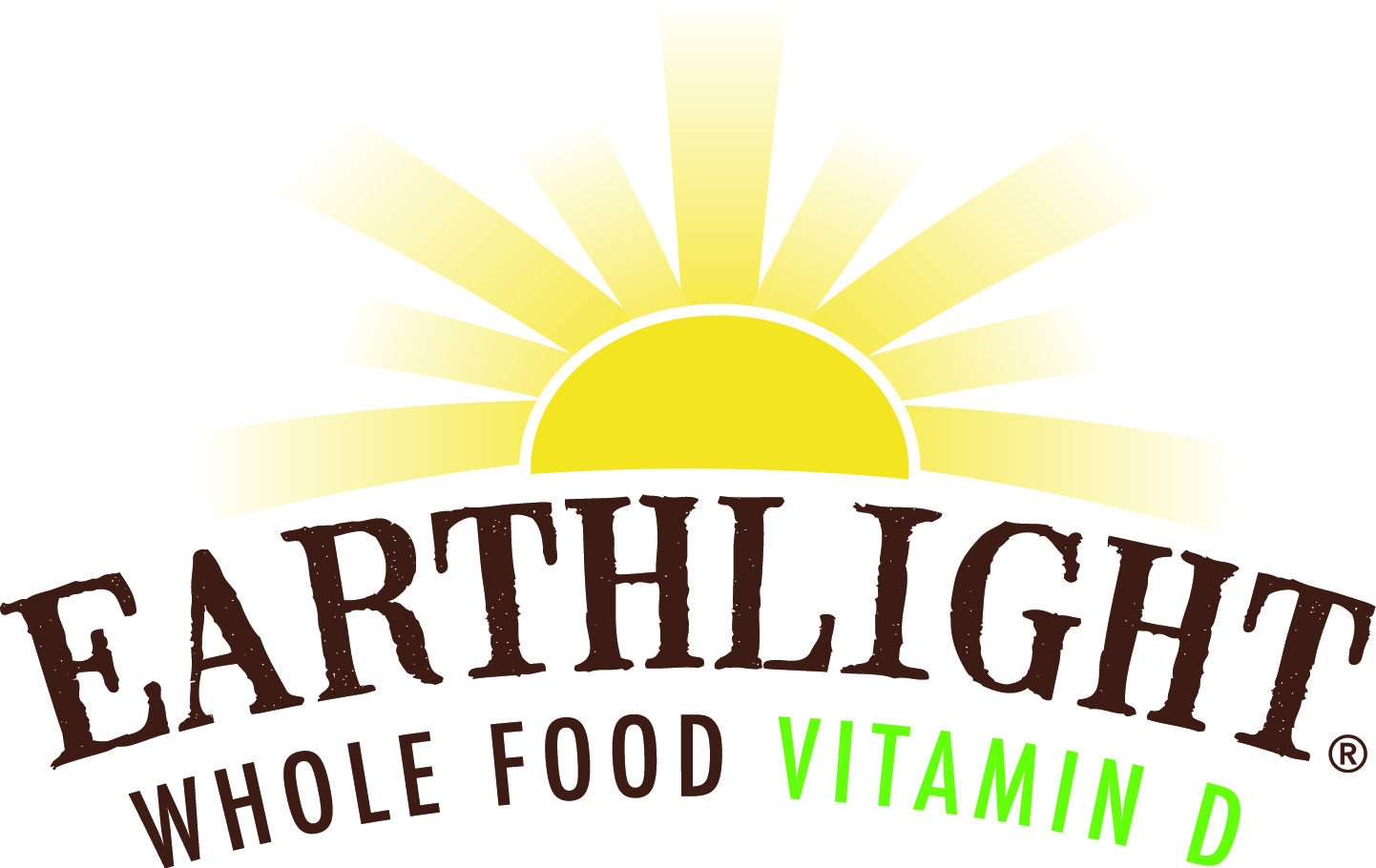
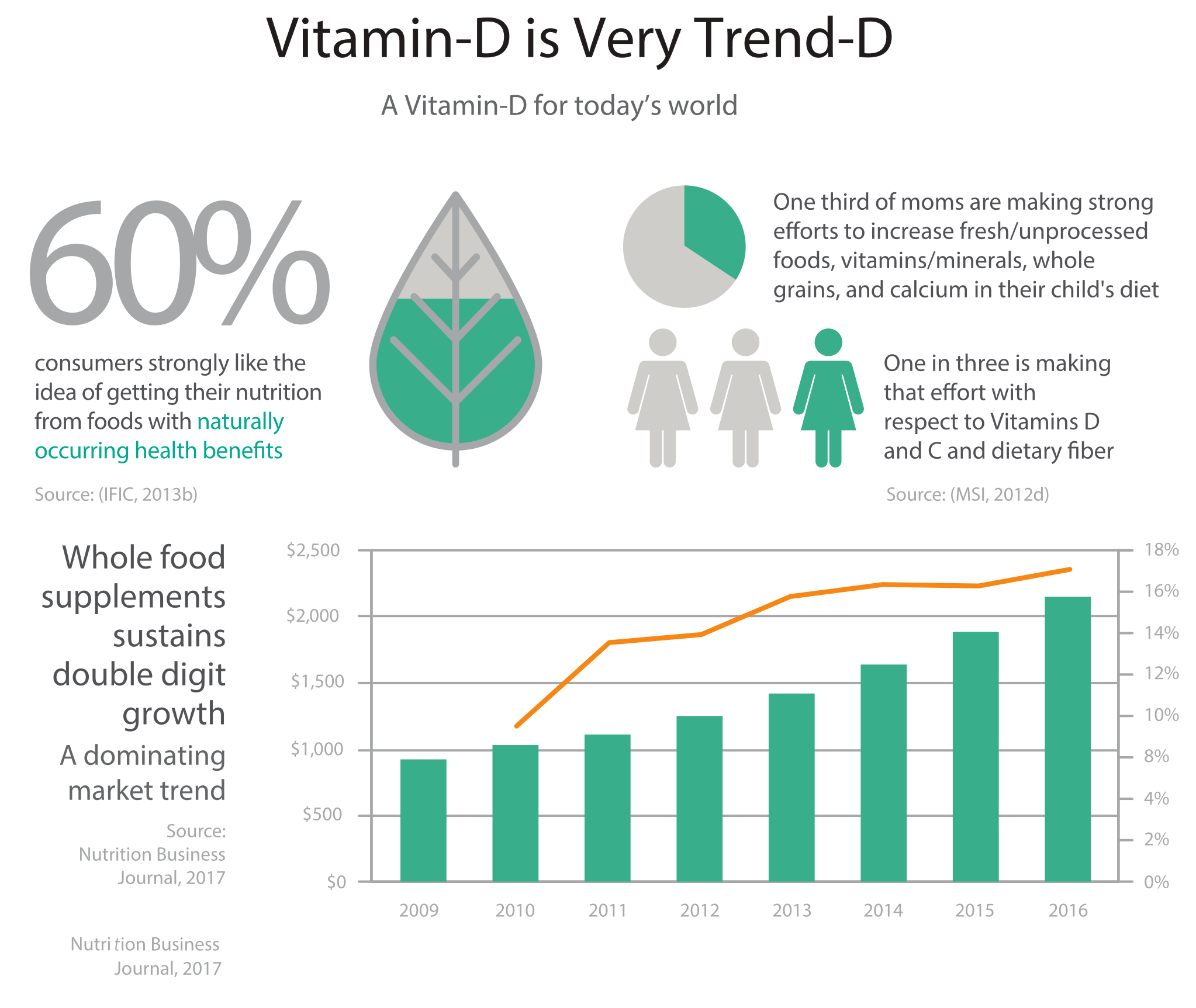


Comments and Discussion (Powered by the PricePlow Forum)